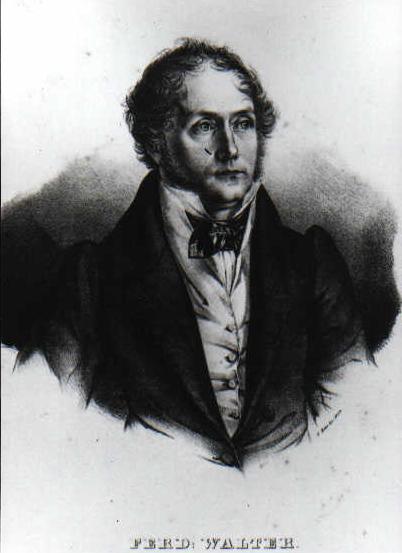Ferdinand Walter on:
[Wikipedia]
[Google]
[Amazon]
 Ferdinand Walter (born at
Ferdinand Walter (born at
 Ferdinand Walter (born at
Ferdinand Walter (born at Wetzlar
Wetzlar () is a city in the state of Hesse, Germany. It is the twelfth largest city in Hesse with currently 55,371 inhabitants at the beginning of 2019 (including second homes). As an important cultural, industrial and commercial center, the un ...
, 30 November 1794; died at Bonn
The federal city of Bonn ( lat, Bonna) is a city on the banks of the Rhine in the German state of North Rhine-Westphalia, with a population of over 300,000. About south-southeast of Cologne, Bonn is in the southernmost part of the Rhine-Ruhr r ...
, 13 December 1879) was a German jurist, member of the Prussian National Assembly
The Prussian National Assembly (German: ''Preußische Nationalversammlung''), came into being after the revolution of 1848 and was tasked with drawing up a constitution for Prussia. It first met in the building of the ''Sing-Akademie zu Berlin' ...
and professor at the University of Bonn
The Rhenish Friedrich Wilhelm University of Bonn (german: Rheinische Friedrich-Wilhelms-Universität Bonn) is a public research university located in Bonn, North Rhine-Westphalia, Germany. It was founded in its present form as the ( en, Rhine U ...
.
Life
After studying at the Latin school ofMülheim
Mülheim, officially Mülheim an der Ruhr () and also described as ''"City on the River"'', is a city in North Rhine-Westphalia in Germany. It is located in the Ruhr Area between Duisburg, Essen, Oberhausen and Ratingen. It is home to many compan ...
on the Rhine
), Surselva, Graubünden, Switzerland
, source1_coordinates=
, source1_elevation =
, source2 = Rein Posteriur/Hinterrhein
, source2_location = Paradies Glacier, Graubünden, Switzerland
, source2_coordinates=
, so ...
(1805-9), and later at Cologne
Cologne ( ; german: Köln ; ksh, Kölle ) is the largest city of the German western States of Germany, state of North Rhine-Westphalia (NRW) and the List of cities in Germany by population, fourth-most populous city of Germany with 1.1 m ...
(1809-13), he fought against Napoleon I
Napoleon Bonaparte ; it, Napoleone Bonaparte, ; co, Napulione Buonaparte. (born Napoleone Buonaparte; 15 August 1769 – 5 May 1821), later known by his regnal name Napoleon I, was a French military commander and political leader who ...
in 1814, as a volunteer in a Russian regiment. In autumn, 1814, he began to study jurisprudence at Heidelberg
Heidelberg (; Palatine German language, Palatine German: ''Heidlberg'') is a city in the States of Germany, German state of Baden-Württemberg, situated on the river Neckar in south-west Germany. As of the 2016 census, its population was 159,914 ...
, where he graduated, 22 November 1817. He remained at Heidelberg as ''Privatdozent
''Privatdozent'' (for men) or ''Privatdozentin'' (for women), abbreviated PD, P.D. or Priv.-Doz., is an academic title conferred at some European universities, especially in German-speaking countries, to someone who holds certain formal qualific ...
'' until Easter, 1819, where he was called to the newly founded University of Bonn
The Rhenish Friedrich Wilhelm University of Bonn (german: Rheinische Friedrich-Wilhelms-Universität Bonn) is a public research university located in Bonn, North Rhine-Westphalia, Germany. It was founded in its present form as the ( en, Rhine U ...
. He taught various juristic branches there until 1875, when he resigned on account of blindness.
A layman, Walter was a strenuous champion of the rights of the Catholic Church against civil encroachment. He was a member of the Prussian National Assembly
The Prussian National Assembly (German: ''Preußische Nationalversammlung''), came into being after the revolution of 1848 and was tasked with drawing up a constitution for Prussia. It first met in the building of the ''Sing-Akademie zu Berlin' ...
in 1848 and of the First Chamber of Deputies in 1849. In a special pamphlet (1848) he opposed the incorporation into the criminal code of an article allowing the State to deprive the clergy of ecclesiastical rights, and on 4 October 1849, he delivered an oration in defense of ecclesiastical independence in the management of church affairs.
Works
His most famous work is his ''"Lehrbuch des Kirchenrechts"'' (Bonn, 1822) anon law textbook The eighth edition was translated into French and Spanish, the ninth into Italian. A fourteenth edition was prepared by Canon Gerlach, one of Walter's disciples (Bonn, 1871). The sources of canon law, which were added as an appendix to the sixth edition of the ''"Kirchenrecht"'', he materially enlarged and published separately as ''"Fontes juris ecclesiastici antiqui et hodierni"'' (Bonn, 1862). His other important works are: ''"Corpus juris Germanici antiqui"'' (3 vols., Bonn, 1824); ''"Romische Rechtsgeschichte"'' (Bonn, 1836); ''"Deutsche Rechtsgeschichte"'' (Bonn, 1853); ''"System des deutschen Privatrechts"'' (Bonn, 1855); ''"Das alte Wales"'', (Bonn, 1859), on the history, laws, and religion of ancient Wales; ''"Juristische Encyclopadic"'' (Bonn, 1856); ''"Naturrecht und Politik"'' (Bonn, 1863); ''"Aus meinem Leben"'' (Bonn, 1865), an autobiography; ''"Das alte Erz stift und die Reichsstadt Koln"'' (Bonn, 1866), a civil history of the former electorate of Cologne, left unfinished.External links
* {{DEFAULTSORT:Walter, Ferdinand 1794 births 1879 deaths Canon law jurists Jurists from the Kingdom of Prussia Academic staff of the University of Bonn 19th-century German jurists Members of the Prussian National Assembly